At the outset, I wish to declare my disagreement with the Supreme Court that the Public Order Act is in line with the Gambia Constitution 1997. I hold the view that certain key provisions of the Public Order Act are directly and unequivocally in contravention to the Constitution and inimical to democratic society hence should have been declared unconstitutional.
The contentious issues in the Public Order Act are Section 5 on processions and Section 6 on the use of a loudspeaker. It states that to embark on a procession within Banjul or Kanifing Municipality one needs to apply to the IGP or to a Governor in case of a region for a permit. For the use a loudspeaker within the Greater Banjul Area the Act says one needs to obtain the consent of the IGP or the Governor in the case of using a loudspeaker in the regions.
The Public Order Act is a 1961 law, which was first amended in 1963 and then further amended in 2009 to make it even more draconian. Therefore this Supreme Court ruling can be classified as a colossal blow that throws the Gambia back to colonialism and dictatorship.
The letter and spirit of the Gambia Constitution guarantee the right to protest first and foremost. Like many other rights, the right to demonstrate or protest peacefully is not absolute. There are restrictions imposed on the right as in Section 25 sub-section 4 for the purpose of protecting public morality, national security or contempt of court among others. However these restrictions, according to international human rights norms have to be set in law and necessary in a democratic society as well as serve a legitimate interest.
While these limitations give the power to the state to stop a protest, yet it does not mean that for citizens to protest in the first place they have to first request a permit to be approved by the police or not. By giving such power to the police effectively means the decision to enjoy that right has been taken away from the citizen and handed over to the state, i.e. the IGP or the Governor or any other person authorized by the President. Such power constitutes a violation because it means that the IGP and the Governor hold a power that is beyond and above the limitation prescribed in both the Gambia Constitution and the African Charter. A limitation does not justify a violation of a right.
The unconstitutionality and undemocratic nature of sections 5 and 6 lie in the discretionary or arbitrary nature of the decision of the IGP or a Governor to grant or deny a permit. Section 5(2) states that the IGP or Governor can only issue a permit if he “is satisfied that the procession is not likely to cause a breach of peace”. In the case of the use of loudspeaker, the Act under Section 6(1) merely empowers the IGP or Governor to consent or not without stating any reasons or standards. These provisions therefore place the right to protest at the whims and caprices of the IGP or the Governor regardless yet the Supreme Court decided to ignore the unconstitutionality of these provisions.
If the Justices of the Supreme Court had paid enough attention to the limitations imposed by the Constitution, then they would have realized that there is no more any need to give extra powers to the State to impose extra limitations. This creates double layer of limitations for which the end result can only be a violation of the right to protest and consequently of the Constitution.
These provisions do not even cater for spontaneous protests that could emerge in the spur of the moment as citizens are compelled to react to urgent issues of legitimate public interest or concern. This means the Public Order Act either severely dilutes citizens’ right to enjoy Section 25 at best or outrightly violates the Constitution at worse or both.
In fact in his book, ‘The Law of the African (Banjul) Charter on Human and People’s Rights (2007), the Chief Justice Hassan Jallow spoke to the issue of limitations of a right and justification for the violation of a right in the mind of the African Commission. He quoted the Commission as stating that no restriction justifies States to violate a human right either through claw-back clauses or such powers as created by the Public Order Act. Chief Justice Jallow noted that, “local law cannot impose limitations to the rights which do not fall within those permitted by the Charter (pp164).” Yet here is the Public Order Act of the Gambia directly imposing and justifying restrictions that clearly violate Article 11 of the African Charter!
Any law or entity that denies citizens to enjoy an entrenched right clearly violates the Constitution. The unconstitutionality and undemocratic nature of the Pubic Order Act can be viewed from another angel, i.e. freedom of speech, which is also guaranteed in the Constitution. Yet no citizen is required to seek a permit from the IGP or Governor first before one expresses his or her opinion. But we know that a citizen can express a hateful or violent speech anytime, which can threaten national security or public morality.
What is expected in that case is that any citizen who expresses such hateful speech is arrested and prosecuted for violating the law. But one cannot ask citizens to first request a permit before they express an opinion. Such a requirement will deny a right to free speech hence violate the Constitution. Why then justify the existence of a law to further restrict the right to peaceful assembly when the Constitution already has the necessary limitations stipulated? Are those not enough?
A request for permit is a restriction of the right to protest hence a violation of freedom of assembly hence a limitation to democracy, which is a contravention of the Constitution. The purpose of the Gambia Constitution is to create a democratic society based on the sovereign rights of citizens. This is why there is Chapter 4 entitled ‘Fundamental Rights and Freedoms’. These are entrenched rights for which the aim of the Constitution is to protect citizens or Right Holders to enjoy them and to put an obligation on the State or the Duty Bearer to protect citizens to enjoy their rights. Hence the Constitution does not envisage a system that will limit the enjoyment of these rights through a permit regime.
This decision by the Supreme Court is therefore a terrible setback and disgrace for the Gambia especially given the current trends within the sub-region and Africa and the world at large.
For example the Nigerian Federal High Court had ruled way back in 2005 that the country’s Public Order Act “is an aberration to a democratic society.” In a suit brought before it by 17 political parties against the IGP, the Court noted that “no police permit or any authority is required for holding a rally or procession in any part of the Federal Republic of Nigeria” and that “the provisions of the Public Order Act, which prohibit the holding of rallies or processions without police permit are unconstitutional having regard to section 40 of the 1999 Constitution and Article 11 of the African Charter”
Section 40 of the Nigerian Constitution, which is almost identical with Section 25(d) of the Gambia Constitution, stipulates that, “Every person shall be entitled to assemble freely and associate with other persons, and in particular he may form or belong to any political party, trade union or any other association for the protection of his interests.”
Yet completely dissatisfied with the judgment of the Federal High Court the Inspector-General of Police of Nigeria appealed to the Court of Appeal in Abuja in 2007 whose Justices unanimously affirmed the judgment of the Federal High Court that the “Public Order Act is unconstitutional.” We also know that in 2015 the Supreme Court of Seychelles also ruled in favour of two opposition parties and a citizen that the country’s Public Order Act was unconstitutional for the same reasons as made by the Nigerian courts.
Furthermore and quite significantly, the African Commission on Human and People’s Rights adopted what it called ‘Guidelines on Freedom of Association and Assembly in Africa’ at the Commission’s 60th Ordinary Session held in Niamey, Niger, from 8 to 22 May 2017. Section 71 of the Guidelines provides that, “Participating in and organizing assemblies is a right and not a privilege, and thus its exercise does not require the authorization of the state. A system of prior notification may be put in place to allow states to facilitate the exercise of this right and to take the necessary measures to protect public safety and rights of other citizens.” This provision is in recognition and protection of Article 11 of the Africa Charter on Human and Peoples’ Rights, which provides for freedom of assembly:
“Every individual shall have the right to assemble freely with others. The exercise of this right shall be subject only to necessary restrictions provided for by law in particular those enacted in the interest of national security, the safety, health, ethics and rights and freedoms of others.”
The restrictions regime in this provision just as in the Gambian or Nigerian constitution does not imply a permit rather they merely indicate that the right is not absolute and could be restricted for specified and legitimate reasons. Hence the police cannot and do not have the authority to grant or deny a permit a priori because that would practically mean that the right to protest is in the hands of the police to give or not to give.
Therefore what the Gambia need is a notification regime where the police are informed within reasonable time about protests in order to make the necessary preparations to provide the necessary security to all. But even there the African Commission said in their Guidelines, Section 71(b) that failure to notify is no ground to deny the right to protest or make an assembly illegal.
One will find this same notification regime in the UK Public Order Act of 1986 where organizers are expected to notify the police at least 6 days before their protest. But the UK law allows spontaneous, small and customary assemblies to take place without notification. And even where an organizer fails to notify the police, the law provides that one can give defense that circumstances prevented you not to notify under Section 13(4) hence commit no offence.
What the Nigerian or Seychelles Supreme Court or the UK Public Order Act demonstrates is that protests are the heart of democracy and good governance. They further show us that to protest is a fundamental right on which hinges many other fundamental rights such as the right to petition, freedom of expression, political participation, freedom of the media and the freedoms of association, worship, movement and opinion among others. Hence to create any law that therefore places the right to demonstrate in the control of any entity is indeed a direct contravention of international human rights norms, democratic principles and the Gambia Constitution.
What I expected the Supreme Court to do was to declare Section 5 and 6 of the Public Order Act as unconstitutional so that the Government could address the matter by going to the Parliament to review and amend the whole Act to bring it in line with the Constitution and therefore make it democratic. It must be noted that every society needs a public order law, but this law must be to expand and protect the right to demonstrate and not to infringe on it in any way or manner. The Public Order Act must empower and encourage popular participation in order to enhance democracy and good governance. It must not do the reverse.
This decision by the Supreme Court therefore is a huge reversal of the incredible gains Gambians registered on 1 December 2016. It is indeed sad that just as we are about to mark the first anniversary of that landmark defeat of dictatorship, the Gambia’s Supreme Court has nothing to offer to Gambians to celebrate other than bring back one of the most potent tools of oppression of that dictatorship.
It was under the auspices of this Public Order Act that 16 Gambian children and a journalist were shot to death in 2000 when they protested the murder of a fellow schoolboy by fire service officers and rape of a fellow schoolgirl by paramilitary officers. It was because of this obnoxious Public Order Act that UDP former Campaign Manager Femi Peter’s was sentenced to one year in prison with hard labour in 2009 for using a loudspeaker at a political rally without a permit. It was because of this Public Order Act that Solo Sandeng was killed and scores of citizens tortured and raped in April 2016 for protesting for electoral reforms. It was because of this Public Order Act that the core of the UDP leadership and members including their party leader Ousainou Darboe were persecuted and incarcerated in prison in July 2016 for marching to demand the body of Solo. Yet today the Gambia’s Supreme Court could still maintain that this criminal law is indeed constitutional!
Despite these above-mentioned facts still one wonders whether indeed if the Supreme Court was influenced by the law or by politics to reach the kind of decision they reached. In my view I think the Supreme Court’s decision is political aimed at protecting this Government knowing that a growing awareness and activism is brewing up among Gambians to now stand up to protect their rights and demand efficient services.
Since January 2017 we have seen various communities and scores of citizens and associations raising their voice and demanding transparency and accountability. The height of these citizen actions reached the climax when young people recently sought to occupy Westfield to demand better electricity services. This action has dawned on the State that henceforth a new Gambian is on the scene who will not settle down for inefficiency, poor services, corruption and lack of responsiveness from the State but to stand up for democracy and good governance as required by the Constitution. One would expect that the Supreme Court would therefore allow these constitutional rights and duties of a citizen to flourish and not to stifle them.
I think the Supreme Court has disgraced the Gambia, which is the origin of the African Charter on Human and Peoples’ Rights otherwise called the Banjul Charter as well as seat of the African Commission on Human and Peoples’ Rights. Yet even when that Commission adopted the globally acclaimed Guidelines on Freedom of Association and Assembly in Africa, the Gambia’s Supreme Court deliberately ignored this groundbreaking advancement in human rights by maintaining such a stinking law. After 22 years of unconstitutionality and human rights violations that earned the country a pariah status, the general expectation is that the new dispensation will live up to the standards of the African Charter and international human rights norms and more so to the letter and spirit of the Gambia Constitution.
From the day of that unfortunate ruling, Gambians must now know that the biggest obstacle to democracy and good governance in the Gambia is the Supreme Court of the Gambia. By maintaining the Public Order Act, it means the Supreme Court has further empowered the Gambia Government to deny citizens to hold it to account by demanding transparency, efficiency and responsiveness of state institutions. It means citizens have been restricted in the way they can combat corruption in this society and demand quality products and services and value for money from private companies. It means the space for the perpetration of abuse and violations leading to impunity have been proclaimed in the Gambia by this unfortunate ruling of the Supreme Court.
The task now is for all Gambians to demand the Barrow Government to urgently repeal this Public Order Act and create a new one that protects the right to protest without a permit. Pres. Barrow had vowed in his manifesto that the Public Order Act is one of the undemocratic laws he would repeal within six months of taking office. He is now more than 10 months in office without doing just that. His Minister of Justice had said that his ministry would deliberately not enforce the Public Order Act among other undemocratic and unconstitutional laws pending their repeal or amendment. Yet the country’s highest court decided to glorify this obnoxious law. A very sad day for the Gambia indeed!
For the Gambia, Our Homeland!
Madi Jobarteh

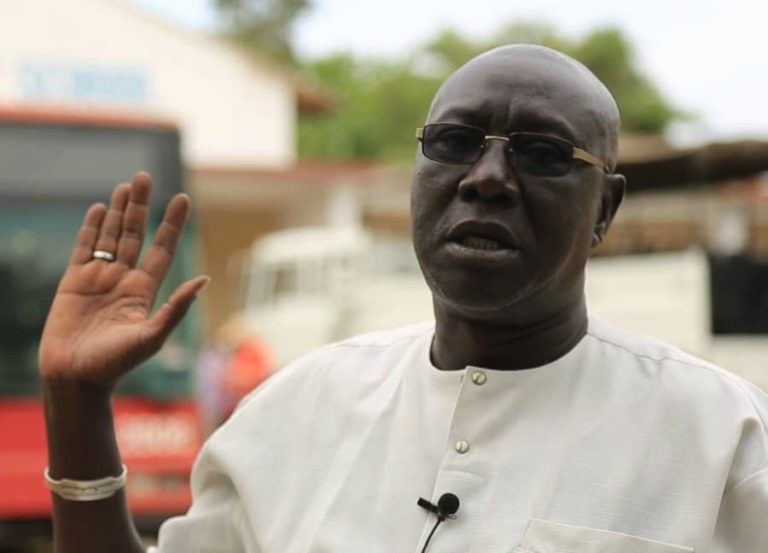

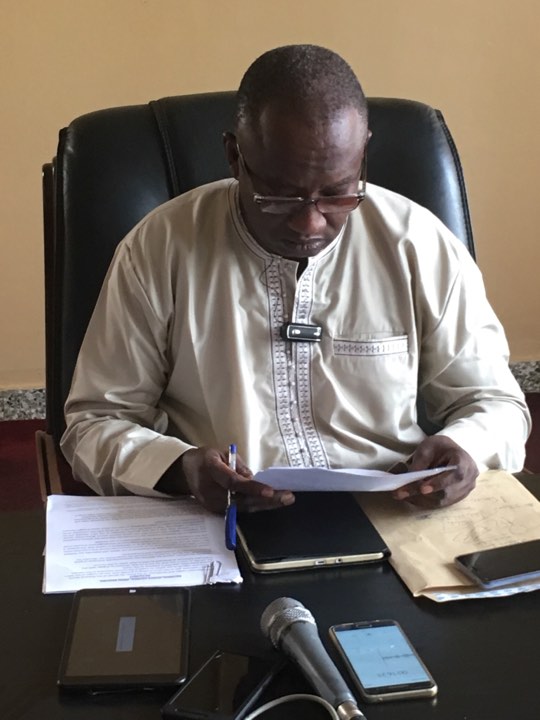
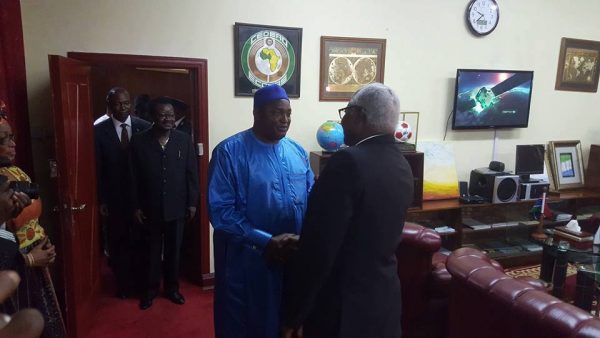



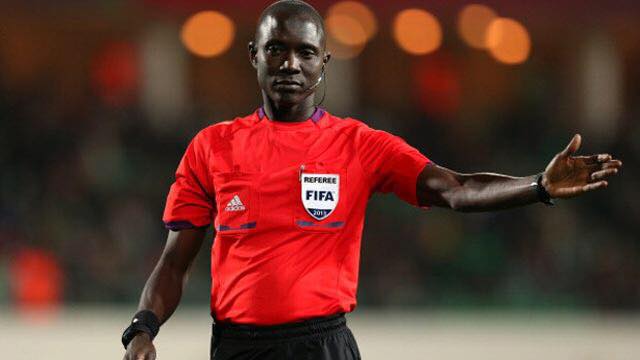
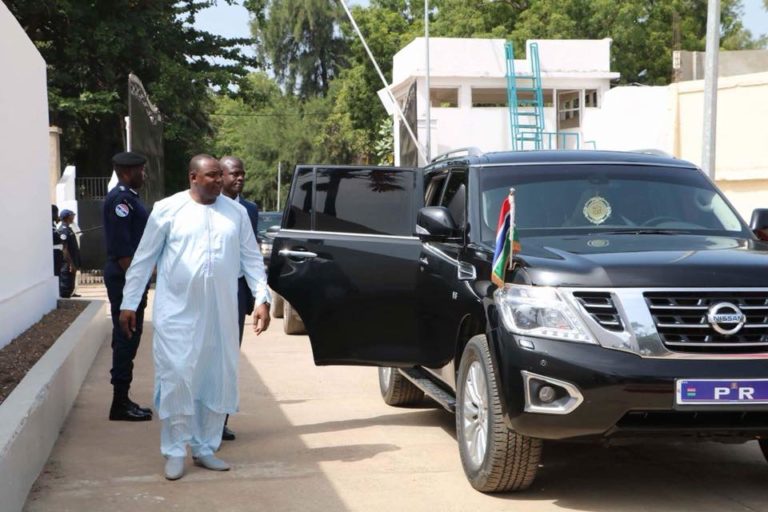


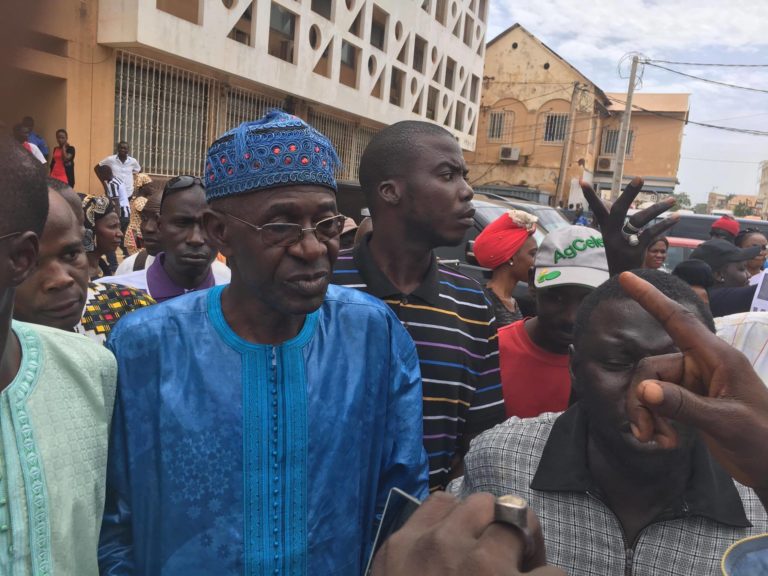
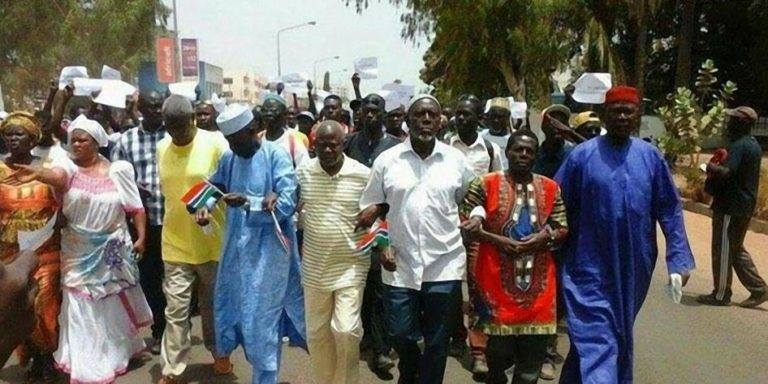

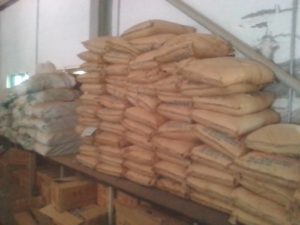



President Koroma: My visit will strengthen Ties Between Banjul And Freetown
By Omar Wally
The president of Sierra Leone Ernest Bai Koroma, has Thursday, November 30 arrived in The Gambia for a two day visit. President Koroma is the first head of state to travel to Banjul on a state visit since President Barrow was elected last December.
He was received at the airport by his Gambian counterpart alongside senior government officials and members of the diplomatic and consular corps.
In an interview with journalists shortly after his arrival, President Koroma said he is The Gambia to provide solidarity and support to a brother and colleague President Barrow.
“I will use my visit to strengthen the already existing excellent relations between the two countries.” He said.
President Koroma who will be stepping down next year said “I’m also here to provide support to one of the great entrepreneurs of The Gambia who is inaugurating a city for relaxation and amusement and to launch the Fourah Bah College alumni associations.” President Koroma added that a good number of Gambians attained their university education at Fourah Bay College at the University of Sierra Leone and other institutions of learning in his country.
“The visit is a home coming and an opportunity to further consolidate the great relationships and share experiences with my dear brother and colleague.”